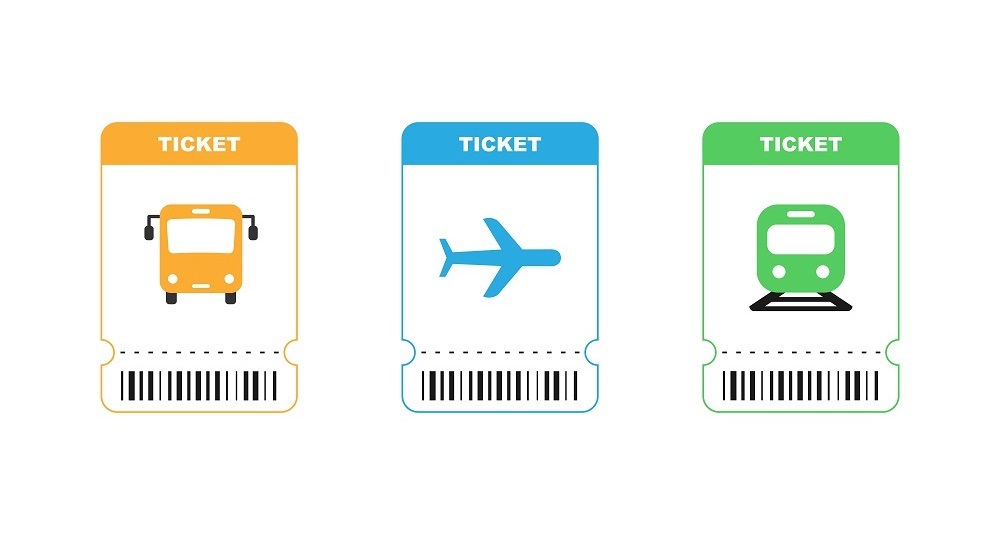
When heading to a new destination, travel plans can be one of the most stressful elements of an upcoming trip. From taking the bus to a train or plane, there are a lot of modes of transportation to choose from, but which is right for you? We’ve got the answer.
We are breaking down the pros and cons of each of the top transportation options to help you choose which is best for your next trip. Let’s dive right in!
Bus Travel

Wondering, “why travel by bus?” As one of the most affordable, convenient transportation options to choose from, many opt for buses when journeying from one place to the next. Not convinced? Here are the perks of choosing a bus for your travels, as well as some of the cons so you understand all the elements of this tried-and-true transportation choice.
Bus Pros
- Affordability: Choosing a bus for transportation is often the cheapest choice, frequently pricing much less than both trains and planes.
- Time Availability: For the popular bus routes, primarily between cities, buses can leave as often as every hour. This is a lot more frequent than planes and some trains, ensuring you have a flexible departure and arrival time.
- More Locations: Buses can go nearly anywhere, from big cities to small towns, making sure you can get exactly where you would like to go. They can even drive through mountain regions. Basically, anywhere there’s a road, a bus can pass.
- Safety: Buses are not only safer than trains but safer than driving your own car, too. This makes them a reliable and secure choice of transport.
- Smooth Trip: Unlike the turbulence, you may experience in the air or the bumpy ride of your own small vehicle, buses offer a super smooth travel experience. All you have to do is sit back and relax while a trusted bus driver takes the lead.
- Accessibility to Tickets: Unlike many plane and train tickets that may sell out, bus tickets are typically readily available, meaning you can get away with booking even just one day in advance – perfect for a spontaneous trip.
- Less Hassle: While security on a plane is an essential element in ensuring a safe travel experience, buses typically have fewer hoops to jump through, making your actual travel day a lot quicker and less stressful. Just locate where your bus’s pickup is and you’re ready to go.
Bus Cons
- Fewer Features: On a bus, you’re not going to get the beverage and food service you do on other modes of transportation. Additionally, many buses don’t have wifi or outlets. For most bus trips, you can expect pretty basic amenities. However, if you’re taking a very long-distance bus, there is a chance you will see meal services or entertainment options, although this is quite rare in the U.S.
- Less Storage for Luggage: When taking the bus, be prepared to pack light. Similar to airlines, buses typically only allow one carry-on and one checked bag. This checked bag usually is required to weigh less than 50 pounds, and your checked bag must fit beneath your seat. If you have additional luggage, some bus companies will charge an extra fee.
- Slower Transportation: Depending on city traffic, speed limits, and the distance you’re going, buses tend to take longer than all other transportation options.
- Iffy Timing: Since buses are so heavily dependent on traffic, their timing can vary quite a bit, making them less reliable. One accident can cause hours of delays, and as buses remain susceptible to traffic issues, they aren’t always perfectly on schedule.
- Less Aesthetic: Unlike the gorgeous clouds you may see while on a plane, a bus’s route is determined by the fastest road option, typically a busy highway. This doesn’t give riders much to look at as highways typically surpass towns to get you where you need to go.
Train Travel

Looking for a quick travel option with a few more perks than a bus? A train may be your best bet. From their increased speed to more space and reliable schedules, there are a lot of benefits to choosing a train for travel, as well as a few considerations to know in advance. To help you determine if a train is the best choice for you, here are the pros and cons of train travel.
Train Pros
- Speed: For certain routes and destinations, you’ll reach your desired location faster by train. While some routes will be faster by another mode of transportation, trains are usually a pretty good bet – just do your research in advance.
- More Mobility: On a train, you are often allowed to get up and move around. Standing on a bus or train can vary a lot, as long-distance train travel is more equipped for you to exit your cabin and walk around.
- Increased Amenities: Particularly with long-distance trains, you’re likely to have dining, bar, and bed options. Even on shorter trips, you will find wifi, outlets, and reclining seats.
- Scenic Routes: Unlike buses that are stuck to highway roads, trains travel through rural, scenic parts along the trip, offering a beautiful sight to watch as you head to your destination.
- Reliability: Since trains don’t have to worry about traffic, they are typically on time, save a few mechanical problems. This means your departure and arrival times are pretty accurate.
- Environmental Impact: Compared to other modes of transportation, trains use less fuel per passenger.
- Luggage Perks: On trains, there are typically fewer luggage restrictions, allowing you to carry more bags without a worry or a fine. Additionally, the luggage isn’t weighed, so if you want to cram all your stuff in one large bag you should be a-okay.
Cons
- Price: The main downside of choosing a train for travel is the price. Tickets to ride a train are a lot more expensive than that of a bus, sometimes as much as twice the price. So if you’re debating bus travel vs train travel, buses are a clear winner here. Depending on how far you’re going, it can even be as much as a plane ride.
- Fewer Destination Options: When looking at a bus, train, flight comparison, trains offer the fewest options in terms of stops. While trains will certainly hit all major cities, they may not get close to smaller towns you’re looking to reach.
- Loud: With the train wheels rolling and lots of metalworking hard to get you where you need to know, it’s no surprise that trains are one of the louder forms of transportation. This isn’t conducive to a super quiet, zen trip, although many trains are better equipped to remain somewhat quiet inside.
- Less Mountain Access: Looking to head on a trip to the mountains to ski and hike? A train is unlikely to get you there. Trains can’t climb as seamlessly as planes and buses, and train lines typically avoid mountainous areas.
- Limited Timing: Compared to a bus, trains offer fewer departure and arrival times. With a set amount of trains heading to a location each day, there are fewer options to hitch a ride than other transportation options, while a bus will offer more frequent trips. In the bus vs train debate, the bus wins again here.
Plane Travel

When we look to compare bus, train, and flight options, planes are the standout for their speed and amenities. Traveling long distances that aren’t encumbered by road access or terrain, planes can take you just about anywhere you need to go in a blink of an eye. But it doesn’t come without its flaws. Let’s dive right into the pros and cons of planes.
Plane Pros
- Speed: On a plane, you can reach the complete opposite side of the world on the same day – an amount of time that a train or bus can’t even cross the country in. So, if you’re in a hurry and looking to reach your destination fast, planes are the way to go.
- Flies Over Water: When looking at the different modes of transportation, planes are the only ones (other than boats, of course!) that can get across a body of water, flying you overseas to reach a faraway destination.
- Airport Perks: Before your flight, you will be equipped with everything you need within an airport. From seating, while you wait to restaurants, bars, and shops, there’s plenty to occupy your time and keep you satisfied while experiencing a layover or waiting for your boarding time.
- Reliability: Due to the high volume of passengers coming through airports each day, the plane crew works diligently to keep flights on schedule. Of course, there are delays now and then, but typically your flight’s departure is pretty accurate.
- Long Journey Solution: Planes can actually be a more affordable option when going a long distance. Traveling a long way by bus or train can add up quickly, especially if you have to purchase your own food or even a hotel stay, while a plane will get you there the same day. When factoring in these additional costs, a plane sometimes comes out as the frontrunner.
Plane Cons
- Price: While for very long distances a plane may be more affordable, in general, it is the most expensive ticket option when you compare train, bus, plane. That being said, prices can fluctuate a bit, so it’s important to keep an eye on prices and buy your ticket in advance to keep expenses low.
- Booking In Advance: With prices in mind, it’s always important to book a flight in advance. Typically made at least 2 weeks before a trip, planes don’t allow for as much spontaneity, especially when taking rising costs into account. To ensure a spot on the flight you want, you do have to plan.
- Hassle: With lots of rules, check-ins, security, and luggage restriction, flying can end up being somewhat of a hassle. Security itself can tack a lot of extra time onto a trip, and with baggage restrictions, this can feel like an annoyance as you head to your destination.
- Less Luggage: As mentioned earlier, planes have strict baggage restrictions that mean you can’t take as much with you. Most airlines require a bag is under 50 pounds or they charge an additional fee, and carry-on bags must be small enough to fit into the overhead bin.
- Tight Space: On a plane, you can neither lay down flat (unless it’s international) nor get up and walk around much. With a seatbelt sign remaining on for the vast majority of a trip, you’re confined to a very small seat as the pilot takes you to your next stop.
So Which Option Is Better to Choose For Your Next Trip?
When considering plane, bus, and train travel, one of your first determining factors should be budget. Each mode of transportation, particularly bus vs plane, has an increased ticket price, and while we know you want to get to your destination fast, it needs to be within budget. To prepare, take a look at all ticket options well in advance, and if a plane seems like a good price, it’s best to book it sooner rather than later.
However, it doesn’t have to be all about price. If you’re going a shorter distance, a bus will be a perfectly good choice. With shorter trips, amenities aren’t as essential, and you can get where you’re headed at a fraction of the price. Plus, you’ll be able to skip the security lines and take as many bags as you need. And who is opposed to that?
Ultimately, the transportation option you choose comes down to what is most convenient and important to you. This will vary from person to person and from trip to trip, but by taking the time to research your options, you will find the best mode of transportation for your next adventure.
Conclusion
Whether you’re looking to explore a different country by plane or taking a trip just a few states away by bus or train, there’s a transportation choice that’s best for you. Before booking, consider your budget and preferences to find your best option and finally head out on the trip you’ve been planning.
If you’re still debating bus travel vs train travel or have decided that a bus is just right for you, Chicago Motor Coach has your back. With affordable tickets, driver background checks, and routes locally and out of state, we know a thing or two about the perks of traveling by bus. For more on our services, contact us at 847-577-4300.


